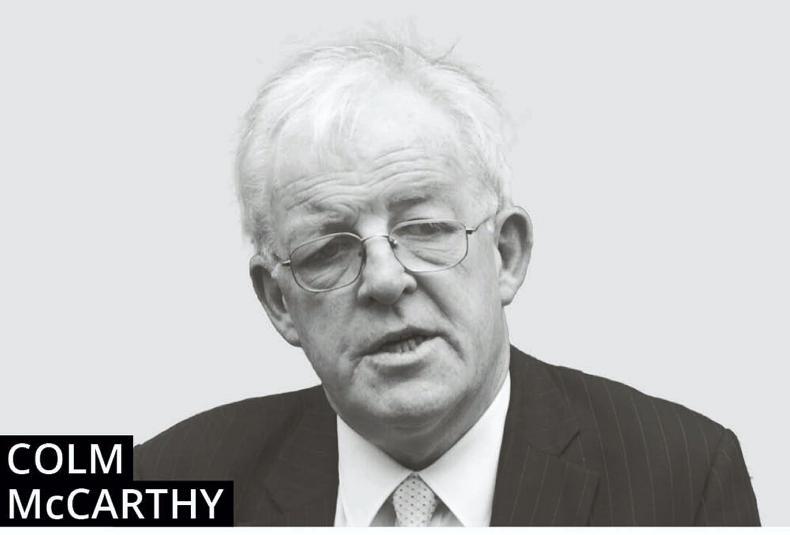Normal politics resumes in September and the main item will be the 2019 budget, due on Tuesday 9 October. Meanwhile, the demands for extra spending and tax giveaways will fill up the empty airwaves of August.
There has already been a big overshoot on health costs for 2018 which will require not just a supplementary estimate for the current year, but a bigger provision for 2019. With election talk also building, the risk is that Government will yield on its fiscal targets, which were not very demanding to begin with.
Even with five straight years of economic growth and a quicker recovery from the bust than had been expected, the budget is still in deficit and no inroads are being made into the mountain of State debt which is the legacy of the bubble-and-bust sequence.
While politicians and lobby groups seek higher spending and tax concessions, there is a chorus from economic commentators for a cautious approach, arguing that the economy is close to full employment again and that any further fiscal expansion is rather pointless.
Last week, the Central Bank governor Philip Lane addressed the MacGill summer school in Donegal and gave two further reasons for getting the budget into surplus sooner than the Government intends.
Some of the recent improvement to the budget numbers could be temporary, he believes, including suspiciously buoyant receipts from corporation tax; and the easy borrowing conditions for the Government these last few years may be coming to an end.
Budget policy
Lane’s comments are interesting, not just because he is Central Bank governor but also because, in his previous incarnation as an economics professor at TCD, he regularly warned during the bubble years against loose budget policy.
He is also aware that a country without its own currency has few available instruments for domestic economic management – there is no exchange rate to vary and the general level of interest rates is determined for the eurozone as a whole by the European Central Bank.
Since that means Ireland cannot have an independent monetary policy, there is an extra premium on getting budget policy right.
In particular, budget policy needs to avoid pumping up the economy when things are going well anyway and Philip Lane has been pushing this view consistently since the 1990s. There would have been a smaller bubble and hence a smaller bust, had he been heeded.
Central Bank governors in most countries have been generous over the years with free advice to finance ministers, who sometimes resent it. One of the key tasks for central banks is oversight of the banking system. Finance ministers like to think that raising taxes and allocating expenditure is their business and that central banks should stick to the knitting.
In Ireland’s case, the Central Bank failed to protect the Exchequer through proper bank supervision during the bubble years. The bust banks required bailout and finance ministers would have had an easier time in the years following the crash had the central bankers been more diligent.
But no eurozone central bank has control over monetary policy and bank supervision has increasingly been centralised in Frankfurt too. The members of the eurozone no longer act like traditional independent central banks – they are more akin to implementing agencies for the European Central Bank. The more the eurozone is reformed in the direction of an integrated monetary union, the less important the national central banks become.
Eurozone governments will not be able to borrow so freely in the years ahead as the ECB withdraws from buying bonds in the market – the current programme will be wound down by the end of the year. Countries with high legacy debt will be under the greatest scrutiny and a re-run of the bond market crisis of 2010, which saw Ireland and several others forced out of the market, is always possible. This is the real motive for getting rid of the ongoing deficit while the opportunity is there.
Budget surplus
Philip Lane was recommending in Donegal an early return to budget surplus and an end to debt accumulation, the policy pursued successfully during the 1990s after the last great Irish fiscal crisis of the previous decade. The payoff is the prospect of easier access to the markets should economic conditions worsen in the years ahead, and the avoidance of involuntary austerity for some future government.
The Irish economic recovery is already getting long in the tooth – it is tempting fate to presume that there can be no interruption.
Brexit is a threat even if the damage-limitation variant is chosen, there is an international trade war under way courtesy of Donald Trump and Ireland’s corporation tax regime has come under fire. The opportunity should have been taken by now to get the budget into surplus and the Central Bank governor’s advice is timely.
Read more
20 minutes with Philip Lane, Central Bank of Ireland
Normal politics resumes in September and the main item will be the 2019 budget, due on Tuesday 9 October. Meanwhile, the demands for extra spending and tax giveaways will fill up the empty airwaves of August.
There has already been a big overshoot on health costs for 2018 which will require not just a supplementary estimate for the current year, but a bigger provision for 2019. With election talk also building, the risk is that Government will yield on its fiscal targets, which were not very demanding to begin with.
Even with five straight years of economic growth and a quicker recovery from the bust than had been expected, the budget is still in deficit and no inroads are being made into the mountain of State debt which is the legacy of the bubble-and-bust sequence.
While politicians and lobby groups seek higher spending and tax concessions, there is a chorus from economic commentators for a cautious approach, arguing that the economy is close to full employment again and that any further fiscal expansion is rather pointless.
Last week, the Central Bank governor Philip Lane addressed the MacGill summer school in Donegal and gave two further reasons for getting the budget into surplus sooner than the Government intends.
Some of the recent improvement to the budget numbers could be temporary, he believes, including suspiciously buoyant receipts from corporation tax; and the easy borrowing conditions for the Government these last few years may be coming to an end.
Budget policy
Lane’s comments are interesting, not just because he is Central Bank governor but also because, in his previous incarnation as an economics professor at TCD, he regularly warned during the bubble years against loose budget policy.
He is also aware that a country without its own currency has few available instruments for domestic economic management – there is no exchange rate to vary and the general level of interest rates is determined for the eurozone as a whole by the European Central Bank.
Since that means Ireland cannot have an independent monetary policy, there is an extra premium on getting budget policy right.
In particular, budget policy needs to avoid pumping up the economy when things are going well anyway and Philip Lane has been pushing this view consistently since the 1990s. There would have been a smaller bubble and hence a smaller bust, had he been heeded.
Central Bank governors in most countries have been generous over the years with free advice to finance ministers, who sometimes resent it. One of the key tasks for central banks is oversight of the banking system. Finance ministers like to think that raising taxes and allocating expenditure is their business and that central banks should stick to the knitting.
In Ireland’s case, the Central Bank failed to protect the Exchequer through proper bank supervision during the bubble years. The bust banks required bailout and finance ministers would have had an easier time in the years following the crash had the central bankers been more diligent.
But no eurozone central bank has control over monetary policy and bank supervision has increasingly been centralised in Frankfurt too. The members of the eurozone no longer act like traditional independent central banks – they are more akin to implementing agencies for the European Central Bank. The more the eurozone is reformed in the direction of an integrated monetary union, the less important the national central banks become.
Eurozone governments will not be able to borrow so freely in the years ahead as the ECB withdraws from buying bonds in the market – the current programme will be wound down by the end of the year. Countries with high legacy debt will be under the greatest scrutiny and a re-run of the bond market crisis of 2010, which saw Ireland and several others forced out of the market, is always possible. This is the real motive for getting rid of the ongoing deficit while the opportunity is there.
Budget surplus
Philip Lane was recommending in Donegal an early return to budget surplus and an end to debt accumulation, the policy pursued successfully during the 1990s after the last great Irish fiscal crisis of the previous decade. The payoff is the prospect of easier access to the markets should economic conditions worsen in the years ahead, and the avoidance of involuntary austerity for some future government.
The Irish economic recovery is already getting long in the tooth – it is tempting fate to presume that there can be no interruption.
Brexit is a threat even if the damage-limitation variant is chosen, there is an international trade war under way courtesy of Donald Trump and Ireland’s corporation tax regime has come under fire. The opportunity should have been taken by now to get the budget into surplus and the Central Bank governor’s advice is timely.
Read more
20 minutes with Philip Lane, Central Bank of Ireland









SHARING OPTIONS